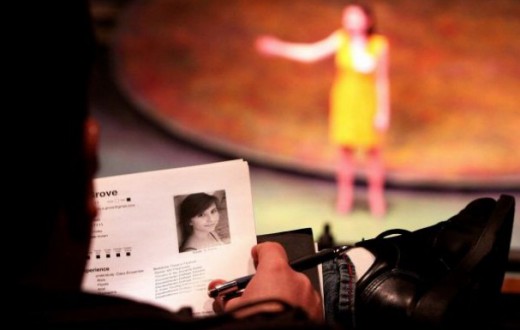Actors are often inspired by the performances of other actors, and it’s not uncommon for aspiring stars to imitate their favorite actors in order to build their own acting techniques. Whether it’s their ability to fully embody a character or their captivating stage presence, these performers, or mentors, if you will, can serve as a source of inspiration for your own craft. But how can you take that inspiration and use it to improve your own performances without falling into the trap of imitation? Let’s explore the benefits of “stealing inspiration” from other actors, how to find that inspiration and how to incorporate it into your own work while maintaining your own unique voice.
Benefits of Stealing Inspiration
By learning from established actors who have already achieved mastery in their craft, you can avoid common mistakes, learn more quickly and ultimately improve the quality of your own performances. One of the most effective ways to learn from the best is by watching their performances. Analyzing their choices in character development, emotional range and physicality can give you a deeper understanding of what makes great acting. It’s also important to pay attention to how they work on set — their methods for rehearsing scenes, collaborating with directors and other actors and staying focused during long shoots.
Another way to learn from top actors is by seeking out opportunities for mentorship or coaching. Many established actors offer classes or one-on-one sessions where they share their expertise and provide personalized feedback on your own performances.
Richard Lawson, for example – who has over 50 years experience in the business. You’ll recognize him in a hot second after seeing his mugshot in this DirectSubmit NYCastings interview.
Finding New Approaches to Character Development and Storytelling
One effective way for you to develop your characters is by doing research. This can involve reading books or articles about the time period or culture in which the character lives, watching movies or TV shows that take place during that time period or even talking with people who have firsthand experience with similar situations. Another strategy is to experiment with physicality and voice. By exploring different postures, gestures, accents and vocal inflections, you can discover ways of expressing your characters’ personalities that you might not have considered before.
I want to talk a bit about posture. Let me know if you’ve noticed this or if it’s just me reading too much into this – trained actors seem to have better posture than untrained actors. Here we have a still from Pirates of the Caribbean. Untrained Johnny Depp is hunched over while trained Orlando Bloom and Naomie Harris have their shoulders back. Hmmm. Head over to DirectSubmit NYCastings and follow to leave a comment.
Building a Personal Style and Voice
Building a personal style and voice is crucial if you want to stand out. A unique style and voice can make you memorable, captivating and even iconic. It’s important for you to find your individuality and develop your own brand so you can separate yourself from the rest of the pack.
One way to build a personal style is by studying different acting techniques, genres and trends. You should be well-versed in different styles of acting so you can choose what works best for you. You should also analyze your strengths, weaknesses and preferences to create a unique approach that showcases your skills but also feels authentic. An actor’s personal style should reflect who they are as a person while still allowing them to transform into various characters.
When I mention “stealing” inspiration, you may think of imitating. Imitating others doesn’t mean copying everything they do. It’s about observing their work closely and identifying what resonates with you. For example, if you admire an actor’s ability to convey emotions through subtle gestures or facial expressions, you can try incorporating that into your own work. As you experiment with different techniques and styles, you’ll gradually develop your own unique approach that reflects your personality and sensibilities.
Paying Attention to Non-verbal Cues and Body Language
While non-verbal cues and body language are important on stage or on screen, paying attention to these cues can also improve communication in our everyday lives. Understanding non-verbal cues can help us better interpret what others are feeling and thinking, allowing us to respond appropriately. You should keep mental notes on how you and others respond so if needed, you can pull it out of your pocket.
One of the most important aspects of non-verbal communication is facial expressions. A smile can indicate happiness or friendliness, while a furrowed brow may signal confusion or concern. Similarly, we can learn a lot from someone’s posture – a slouch might indicate boredom or disinterest, while standing up straight suggests confidence and engagement.
Quick Sidenote:
Pay attention to people in normal surroundings, such as when you go to the food store. Take a mental note on who is smiling, who is rushing around, who is screaming at their kids. At the same time, keep a smile on your face as you shop. I’ve been doing this for years and I still don’t naturally smile when I’m at the food market. It takes effort to keep a happy look on my face, but I’ll tell you, when others pass by me, they see my smile and for just that moment, it makes them happy. As an actor, you want to be able to do expressions without effort. Practice!
Using Inspiration to Inform Character Choices and Scene Work
We all know that by immersing yourself in the world of your character and their circumstances, you can make informed choices about how they would act, think and feel in each scene. So I’m not going to talk about this.
However, did you know that seeking inspiration from other forms of art, such as literature, music and visual art, can provide a wealth of ideas and insights that can inform your performance? You may have read interviews with actors who make a music playlist based on what their character would listen to. Expand on that… what types of books would they read (if at all?), what type of art do they enjoy? Using other forms of inspiration, such as this, will round out your character.
Adapting Techniques to Fit Individual Strengths and Weaknesses
As an actor, it’s important to understand your unique strengths and weaknesses. Adapting techniques to fit individual abilities can help you perform better.
One way to adapt performance techniques is by focusing on the areas where you excel. If you have a powerful voice, you may choose to focus on vocal projection. By highlighting your strengths, you can build confidence in yourself and your abilities.
On the other hand, it’s also crucial for you to work towards improving weaker areas. An actor who struggles with emotional depth may choose to work on this area by studying method acting techniques or taking classes that focus specifically on character development.
It all comes back to stealing inspiration. Find your weaknesses in the strengths of others. Manipulate your findings to adapt to what you need to bring forth as an actor.
Struggles With Originality and Authenticity
Ever watch a show and you say, “Oh! He reminds me of so and so…”? That’s exactly what you DON’T want people to say about your performance. But if you draw inspiration from other actors, how can you differentiate yourself?
One of the biggest struggles for actors when it comes to originality is avoiding cliches. It can be tempting to fall back on tried and tested methods, but this can lead to performances feeling stale or unimaginative. You need to find ways to make your portrayal of a character stand out from what has been done before, whether it’s through physicality, vocal choices or subtle nuances.
Authenticity is another important aspect that actors must balance alongside originality. Above, we discussed NOT imitating others. But what if you’re playing a real-life person for a biopic or a fictional character from a famous novel, such as how Kristen Stewart portrayed Princess Diana in the film Spencer?
While it might seem easy to mimic their voice, mannerisms and style of talking, what sets you apart from the rest is your authenticity.
Here are some tips on how to be authentic when imitating others:
– Do your research: Before you start mimicking someone, do thorough research on them. Understand their behavior patterns, speech patterns and body language.
– Practice regularly: Imitating someone is not something that happens overnight; it takes practice and dedication. Spend regular time practicing the mimicking process until you get comfortable with it.
Avoiding Comparisons or Self-doubt
Drawing inspiration from others can lead to self-doubt. How do you know if you’re being authentic or if you’re just copying someone else? Instead of comparing yourself to others, focus on improving yourself. Focus on your own unique strengths and talents.
One way to avoid comparisons is by setting realistic goals and celebrating small victories along the way. By focusing on personal growth rather than external validation, you can build confidence in yourself. Another strategy is to surround yourself with supportive peers who uplift and encourage you rather than fostering a competitive environment.
 Quick Sidenote: (I love my quick sidenotes, by the way)
Quick Sidenote: (I love my quick sidenotes, by the way)
Self-doubt can also creep up when facing rejection or criticism in auditions or performances. No, no, no! The best way to avoid criticism is to be thoroughly prepared. This means not only memorizing your lines but also fully understanding your character’s motivations and back-story. By doing so, you’ll be able to deliver a more authentic performance that will resonate with casting directors or audiences alike. It’s important to remain open-minded when receiving feedback. Rather than getting defensive or dismissive of critiques, use them as opportunities for growth and improvement. Ask questions about what specifically could have been better and how you can make changes in the future.
Resonating with the Audience
If you want to take your acting to the next level, let your favorite actors be your muse. Study their performances and find inspiration in their journey as a performer. Ask yourself what makes them stand out from other actors? How can you use this to become a more successful actor? Take the time to evaluate yourself and make the necessary changes before diving into any project. This will help you create an honest performance that resonates with the audience.








